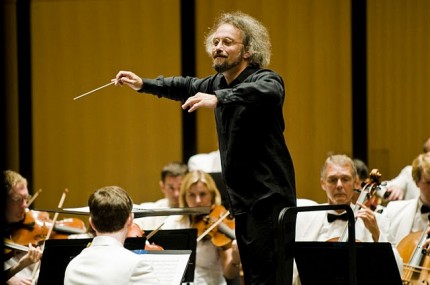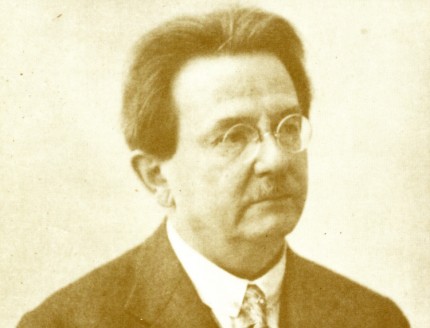Rare Schmidt oratorio to be unsealed at Grant Park this weekend

The final two weeks of the Grant Park Music Festival are hardly going out with a whimper: Shostakovich’s Tenth Symphony and Verdi’s Requiem are coming up next week, and — most intriguing of all — Franz Schmidt’s The Book with the Seven Seals will be heard in its Chicago premiere this Friday and Saturday night.
For Carlos Kalmar, performing Schmidt’s sprawling oratorio has been a long-held ambition.
“I’m so looking forward to this,” Grant Park’s artistic director and principal conductor said on the phone from his home in Vienna during his midsummer break. “As you know, this is what we do at Grant Park. We pull out things that you don’t hear anywhere else.”
Kalmar’s first experience with The Book with the Seven Seals was as a young violinist playing in an orchestra that performed the work on tour under Alois Hochstrasser. While Kalmar recalls the performance as nothing special, he says he was blown away by Schmidt’s music.
“I thought, ‘Holy moley, this is a piece!’ I mean, it’s really long. It’s very demanding. And it has some incredible writing.”
A subsequent performance stoked Kalmar’s interest in the oratorio further but he still had doubts about whether he would ever have the chance to conduct a performance. “My belief was always that if you do not have a killer chorus, don’t try. Because the chorus has to be very good with a lot of power and has to work very hard because the fugues are the most difficult thing. Little by little, Christopher and I have elevated the chorus to the point where I think they can handle the piece, so I thought, ‘Well, this is the time — let’s go!’”

The Austrian composer Franz Schmidt was born in Bratislava, of Hungarian extraction. He enjoyed a successful career as teacher and academic but his private life was beset with tragedy. His first wife wound up being confined in a Vienna mental hospital, where she was euthanized by the Nazis three years after Schmidt’s death. His daughter Emma died suddenly after the birth of her first child, which led to a breakdown by the composer, though he subsequently recovered to write his Symphony No. 4, inscribed as a “Requiem for my Daughter.” Schmidt married a second time but was plagued by health problems in the last decade of his life and died, age 65, in 1939.
Schmidt’s oratorio Das Buch mit sieben Siegeln, completed just two years before his death, is regarded as his greatest work. The Book is a novelty in several ways, not least being written in the 1930s when the oratorio was largely discarded as a viable form by contemporary composers.
In its large-scale setting of passages from the Book of Revelations, the oratorio is cast in a dark almost implacable form, reflective of Schmidt’s surging chromatic style. At times in its fury and Biblical starkness, the work almost seems to predict the terrors that would shortly befall Austria and all of Europe under the spectre of Nazism.
“It was written in 1937 but it’s really not ‘modern,’” says Kalmar. “It’s Late Romantic but I want to say it goes a tiny bit in the direction of Hindemith. When you think Late Romantic, you think Zemlinsky, Schreker, Schoenberg before he did what he did. It’s rich and over-instrumentated.”
Grant Park’s artistic director and principal conductor said his feelings about the work have evolved and changed over the years. “It’s a very important piece. Some conductors have a more religious approach to the piece. I can imagine that if you’re a Catholic you may be more drawn to the piece.”
Kalmar likes the Book due to the unapologetic intensity of the work. “Well, of course the climaxes are incredible! And when the man opens the Seals, the horror that comes out is so dramatic.”
He also appreciates the theatrical flair of the way Schmidt deploys his forces. “The chorus sits there for maybe 15 minutes or more and sings very few notes and very quietly. And then the first time the chorus explodes it makes an impact, not only because it explodes and because of where it happens. That first fortissimo for the chorus is absolutely stunning.”
“You can make this piece very bombastic. And I don’t–I wouldn’t like that idea. The music is very spiritual and that has to be brought out.”
Kalmar believes the role of the Evangelist is the linchpin of any performance of the Schmidt oratorio and he is very much looking forward to collaborating for the first time with Robert Künzli who will tackle that demanding assignment.
“I never worked with him and this role is not the easiest role around. It calls for a lyrical Heldentenor — the Evangelist needs the power and majesty of a Wagner role but he also needs the sweet lyricism of something that came a century before.” Something like the role of Paul in Korngold’s Die tote Stadt? “Absolutely, exactly that.”
While chorus director Christopher Bell has done the preliminary rehearsal work with the Grant Park Chorus, the ensemble will be directed for these performances by William Spaulding, “an old friend of mine,” says Kalmar, who is currently chorus director of the Deutsche Oper in Berlin
Although The Book with the Seven Seals is heard regularly in Austria where Kalmar says it always proves successful with the public, U.S. performances are rarities. Kalmar believes that doing Schmidt’s epic oratorio reaffirms the Grant Park Music Festival’s commitment to presenting rarely heard and overlooked works.
“Christopher and I have outlined what we’re going to do in the next two years. We’re following exactly this line and are going to continue to present pieces that are done very rarely and bring the gems as well.
“This is something that only we at the Grant Park festival can do.”
Carlos Kalmar leads the Grant Park Orchestra and Chorus and soloists in Franz Schmidt’s The Book with the Seven Seals 6:30 p.m. Friday and 7:30 p.m. Saturday at the Pritzker Pavilion. Admission is free. grantparkmusicfestival.com
Posted in Articles





Posted Aug 12, 2011 at 5:32 pm by Paul Forman
The piece is as great, stirring, and striking as Maestro Kalmar says, and Schmidt wrote other music, virtually unheard in the US, that is worth exploring.
Posted Aug 13, 2011 at 4:48 pm by Ed Budzilowicz
I heard Friday night’s performance and, to be honest, while perhaps a compositional “achievement”, the piece is glorified Wagner and Mahler. A matter of more-is-less, like adding frosting on a Linzer torte. To be fair, an unfamiliar piece with long stretches of quiet orchestral passages can’t be appreciated in an outdoor venue flanked by noise from Michigan Ave. on the left, and sirens wailing on Lake Shore Drive to the right. I felt that Maestro Kalmar could have taken this into consideration and moved certain passages along. To make matters worse, the slow passages lacked line, particularly evident in the men’s chorus (downbeat, syllable-syllable-syllable-downbeat) and no fault of that peerless group. I don’t feel I was alone in my assessment. An unusual number of audience left early, perhaps expected for a 20th century work, but this piece is Mahlerian, played in a city in love with Mahler.